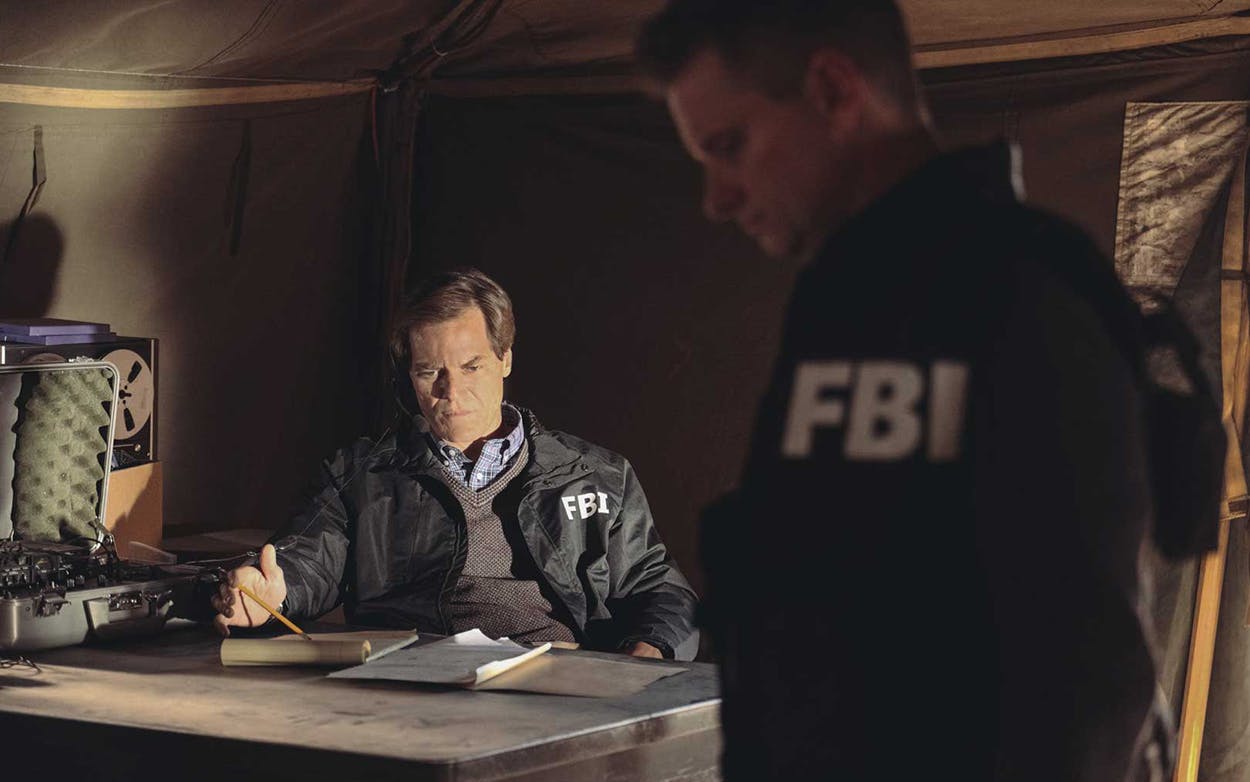The most significant storytelling decision the team behind Waco has made thus far is the depiction of how the gunfire started at Mount Carmel. The ATF maintains that the Branch Davidians ambushed agents with modified weapons. The Branch Davidians say the ATF opened fire on their home despite sect leader David Koresh coming outside unarmed. Waco goes with a standing theory that somewhat splits the difference: some stray ATF agents shot at the Branch Davidians’ dogs to quiet them, both sides heard the shots, and began returning fire.
But no matter how the gunfire started, the raid at Mount Carmel was always going to turn out this way. It was intended to be a spectacle, and the show makes that clear: the ATF could have served Koresh a warrant while he was out on one of his frequent jogs, but they chose not to; ATF commanders knew their cover was blown, but attacked anyway; Koresh, meanwhile, divines that an army would arrive at Mount Carmel’s doorstep to spill Branch Davidian blood. And, sure enough, the armies of Babylon arrived on February 28, 1993.
Within the first five minutes of Wednesday’s installment, Waco depicts the raid’s violent mayhem. Gunshots don’t just hit the walls of Mount Carmel, they rip through its innards and find their victims. Babies don’t just cry, they’re dropped to the ground as their mothers are shot. Branch Davidians and ATF agents don’t simply die, but suffer as the enemy’s bullets slowly drain their life.
And as the third episode of Waco tells it, that carnage was caused by false motives.
From the show’s perspective, the ATF’s chief objective wasn’t saving children from the compound—it was making a name for the bureau. In the episode, after the raid has gone completely sideways, a frustrated ATF agent pushes a KWTX-TV cameraman to the ground as he films the carnage. The cameraman yells back, “Hey, you asked me to be here!” When they invited the local media, the ATF expected to be filmed heroically rescuing women and children rather than gunning them down. But what could they have possibly expected when they brought an army to the doorstep of a group they had determined was preparing for an “end-of-days assault”?
But this, as the show tells it, is also a part of Koresh’s plan: the raid will unlock the fifth of the Seven Seals of Revelations. On the phone with the Sheriff Jack Harwell, as Koresh learns of the deaths on both sides—while suffering from a gruesome stomach wound himself—he quotes the Bible: “It says in Revelation 22, ‘Behold I come quickly; and my reward is with me.’”
The sheriff tells him this isn’t the time to talk theology, they need to figure out how to get Koresh’s people out safely. “You wanna talk to me?” Koresh says. “You go out there, and you find someone who understands—who understands what just happened.”
Enter Gary Noesner, arriving as lead negotiator for the FBI, along with tactical negotiation lead Mitch Decker, taking command of the disaster started by the ATF. Though the series conflates a handful of negotiators and conversations from the real-life events, Noesner represents the negotiation team’s attempt to understand Koresh—if not his doctrine in its entirety, at least what’s important to him. Noesner doesn’t exactly get off on the right foot when he attempts to establish rapport by asking Koresh how to pronounce his last name. “You ever hear someone die before, Gary?” Koresh asks in return. “You say my name like the last death of a dying man. Like a death knell: Kor-essssh.”
The ATF’s arrival at his doorstep seems to transform Koresh into the more controlling, all-powerful cult leader the government imagined him to be. When Noesner suggests on the second day of the siege trading a peaceful surrender for the chance to disseminate the Branch Davidians’ messages on national television, Koresh seems excited. Koresh joyfully yells the news to his wife, Rachel, and in turn excoriates his followers sharing pleasantries downstairs: “Y’all should be mourning and praying for the souls that we lost, not celebrating!”
Koresh tells Rachel that when the nation hears his message, “It’s going to be unlike anything they’ve ever known.” But when Koresh’s message is broadcast on TV, it’s nothing more than a man jumping from Bible verse to Bible verse for 58-minutes. People outside of the compound hear, as a newscaster describes the broadcast, “a rambling discourse” from “a cheap thug.” They hear a man proclaiming to be the Lamb of God, and expecting the world to believe him.
On the other side, the government—who they have a reasonable expectation to believe—is flat out lying to them. The ATF commander announces at their press conference that his agents arrived to an ambush while attempting to serve “a routine search warrant” to the Branch Davidians. As undercover agent Robert Rodriguez listens from the crowd, the commander that he repeatedly warned to call off the raid tells the press that the agent they placed inside the compound didn’t warn them that Koresh was planning an attack. The ATF “now believes he might have been compromised by the group.”
The camera cuts to Noesner, who unlike just about anyone else involved, actively tried to deescalate the situation peacefully, tried to understand. But when there’s so much willfulness standing in the place of justice, there’s often little truth to be found. The camera cuts back to Mount Carmel, zooming over packed suitcases as Noesner’s phone rings at the press conference. It’s Koresh: “God spoke to me—we ain’t coming out.”






